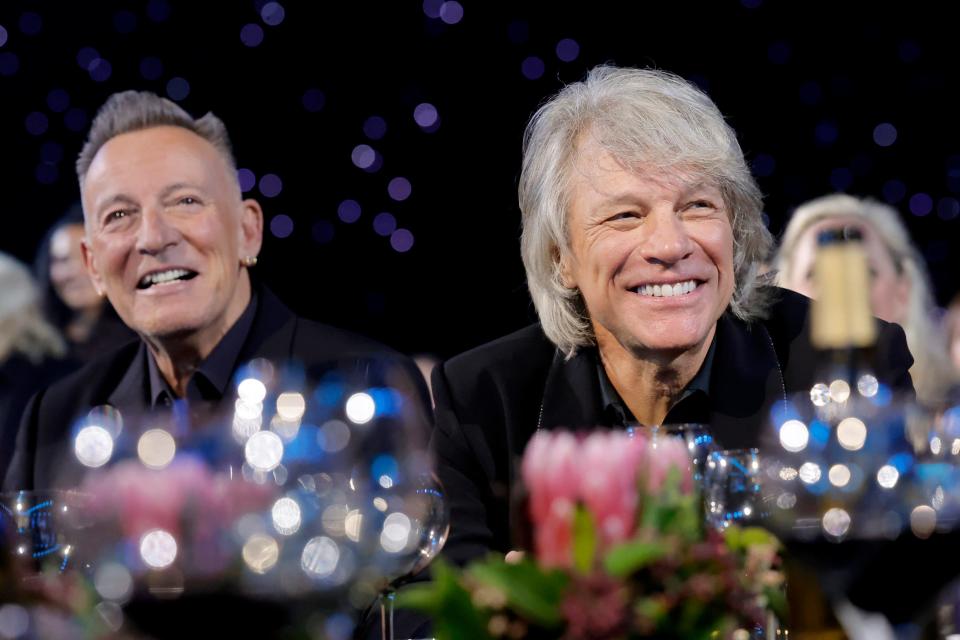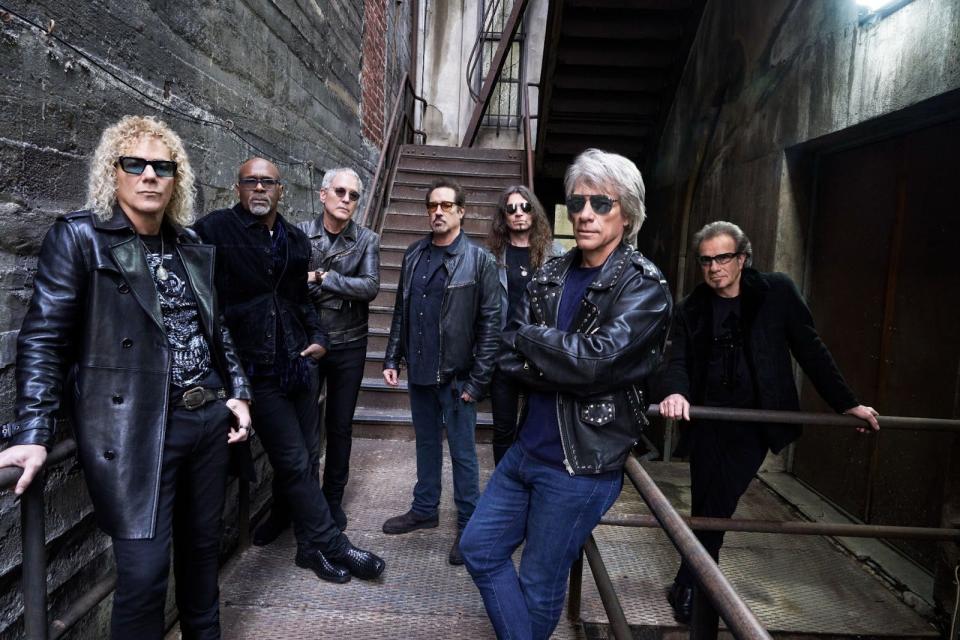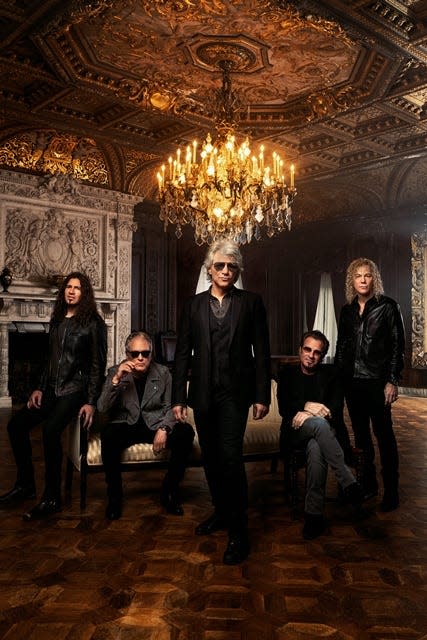Jon Bon Jovi says 'Forever' pays homage to The Beatles, his wife and the working class
As the lights faded in a ballroom of the Los Angeles Convention Center, a wallop of guitar and drums rang through the room.
Jon Bon Jovi, sleek in all black, took his rightful place center stage as drummer Tico Torres, keyboardist David Bryan, bassist Hugh McDonald and guitarists John Shanks and Phil X launched into an anthemic intro of “Whoa-oh-oh-ohs.”
The audience who had come to honor Bon Jovi’s philanthropic efforts at the annual MusiCares gala glanced around with puzzled looks.
Was this a new Bon Jovi song? If so, were they debuting it as the opening salvo at a glitzy Grammys charity event when the MusiCares honoree doesn't usually perform until the end of the night? And was that Paul McCartney sitting at a front table pumping his first along to the very-Bon-Jovi chorus?
Yes, yes and yes.

“Legendary,” the first single from Bon Jovi’s 16th studio album “Forever,” out June 7, received its christening in a room that included McCartney, Bruce Springsteen, Melissa Etheridge, Shania Twain and numerous other music VIPs.
A few weeks later, the infectious pop rock song lyrically rooted in Bon Jovi's trademarks of loyalty, friendship and a blue-collar ethos began its steady chart climb, eventually landing in the Top 10 of Billboard’s Rock Digital Song Sales and Adult Contemporary charts.
It was an auspicious rollout for the band’s first album since “2020” as well as the first for frontman Jon Bon Jovi since undergoing vocal cord surgery in 2022.
During a recent interview about the band’s four-part Hulu documentary, “Thank You, Goodnight: The Bon Jovi Story,” Bon Jovi, 62, also shared some insight into a few of the songs on “Forever.”
More: Billy Joel turns 75: His 75 best songs, definitively ranked
Bon Jovi is still rocking the talk box
The second single from the album, the rhythmically pumping “Living Proof," is coated with another Bon Jovi hallmark – the talk box, which the band reinvigorated from its ‘70s-era origins on its signature smash, “Livin’ on a Prayer,” and bowed to again for 2000’s “It’s My Life.”
“I will give Richie (Sambora) full compliments for commandeering the talk box in 1986,” Bon Jovi says of the band’s original guitarist and frequent song collaborator. “We both knew it of course from (Peter) Frampton and Joe Walsh, but I would think from ’86 forward that instrument belongs to Richie and to Bon Jovi using it again.”
Bon Jovi is careful to credit his forebears for the distinctive wonky sound created by the mouth device and says he returns to the credo his mother told him: “Find out who your influence's influences were … because now if anyone says oh, the talk box, that’s Bon Jovi. No.”
Jon Bon Jovi writes a love letter to his wife

The ninth track on “Forever,” the piano ballad “I Wrote You a Song,” is a sweet testimony of love shaded with insecurity.
“How could it ever be beautiful enough?” Bon Jovi sings in a slightly strained voice.
The target of his affection is obvious, he says. His wife of 35 years, Dorothea.
Words including “I can’t give you the ocean or the sky/the wonders of the world can’t compare to you/I did the only thing I know how to do – I wrote you a song,” as well as the melody, came to Bon Jovi in the middle of the night.
“I had a notebook next to my bed,” he recalls, “which I sometimes do when I’m in a place where I’m writing and I know that position well – in your underwear on the side of the bed, asleep with a pen in your hand and scribbling and you wake up to see every single word of that first verse and the melody written.”
Bon Jovi shared the lyrics with co-writer Billy Falcon but still fretted about landing the perfect title.
“Billy said, ‘I Wrote You a Song’ and I was like, ‘Ah!.’ The simplest thing you could possibly say.”
More: James Taylor talks koalas, the 'gravitational attraction' of touring and Taylor Swift
Bon Jovi salutes The Beatles’ ‘A Day in the Life’
The dozen songs on “Forever” balance between ballads and barroom stompers. “Seeds” is one of the most memorable for its hook and fantastical ending that pays homage to The Beatles’ “A Day in the Life.”
Bon Jovi says he was inspired to write the song while looking out of the window of his Manhattan apartment and watching the people wandering around in a park. “There are 100 stories happening right now and these people don’t even know that their stories are intersecting at this moment,” he remembers thinking at the time.

He credits his “current self-help way” of “trying to get back to joy” for inspiring the image of seeds “trying to find our place in the weeds.”
The song rockets to a swirling strings-and-drums climax that is reminiscent of The Beatles’ ingenious concoction that caps their “Sgt. Pepper’s Lonely Hearts Club Band” album. “Seeds” wraps with a sustained chord, similar to the one that famously closes “A Day in the Life.”
“From inception, I knew what I wanted (with the song) and it was absolutely ‘A Day in the Life,’” Bon Jovi says. He enlisted noted composer David Campbell to arrange the strings.
“I full-on wanted the George Martin, Beatles-esque climb. And I think we achieved it,” Bon Jovi says.
Jon Bon Jovi is hardly a 'Hollow Man'
The closing song on “Forever,” the contemplative “Hollow Man,” might concern fans with its ruminative lyrics over mournful slide guitar.
“What do you sing when the song’s been sung?/Who do you fight when the war is won?/What do you write when the book is done?” Bon Jovi wonders, then later in the song, “How does it work when the words don’t come?”
It might sound like a declaration of defeat, but Bon Jovi isn’t swaggering into the sunset.
Touring remains uncertain because of his self-mandate that his voice is fit enough to perform a 2 ?-hour concert four nights a week. But he’s continuing to rebuild his vocal strength and maintain his optimism.
“Every day,” Bon Jovi says, “I work at it.”
This article originally appeared on USA TODAY: Bon Jovi talks 'Forever' album, tour possibility after health issue
